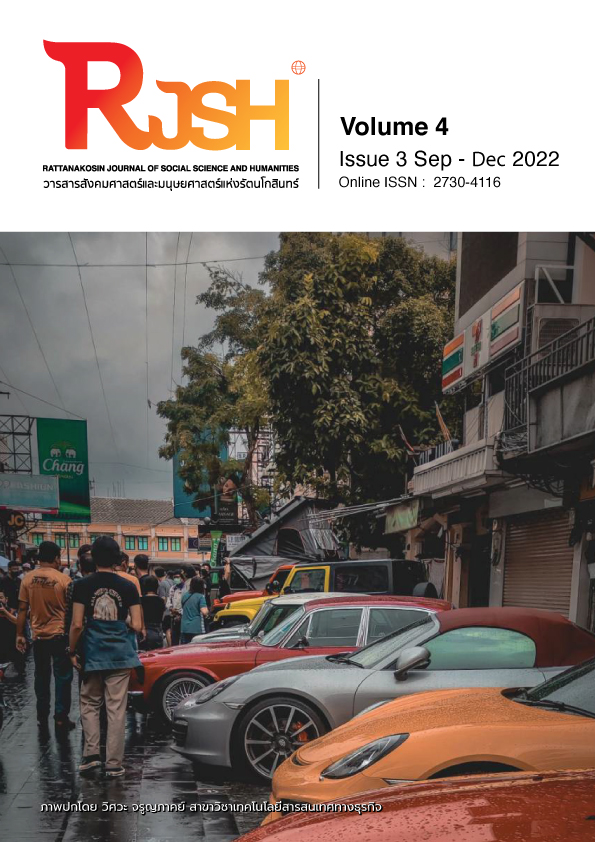Willingness to Disclose Personal Information Through Commercial Banking Applications in Bangkok Metropolitan Region
Main Article Content
Abstract
The purpose of this research is to identify factors that affect the level of willingness to disclose information of service users through commercial banking applications. The conceptual framework of this research is based on the framework of Privacy Calculus. A simple random sampling technique was applied to select 409 commercial banking application users to answer the self-reported questionnaire. Data were analyzed by Linear Regression model analysis. The results showed that factors affecting the level of willingness to disclose personal information of service users through commercial banking applications were disclosure value and trust in the system. It gave more importance to the disclosure value factor than the trust factor in the system because the benefits of disclosure led to risk tolerance and willingness to disclose personal information through commercial bank applications.
Article Details
The content within the published articles, including images and tables, is copyrighted by Rajamangala University of Technology Rattanakosin. Any use of the article's content, text, ideas, images, or tables for commercial purposes in various formats requires permission from the journal's editorial board.
Rajamangala University of Technology Rattanakosin permits the use and dissemination of article files under the condition that proper attribution to the journal is provided and the content is not used for commercial purposes.
The opinions and views expressed in the articles are solely those of the respective authors and are not associated with Rajamangala University of Technology Rattanakosin or other faculty members in the university. The authors bear full responsibility for the content of their articles, including any errors, and are responsible for the content and editorial review. The editorial board is not responsible for the content or views expressed in the articles.
References
ชนิกานต์ โห้ไทย. (2565). การชำระเงินดิจิทัล ทางเลือกหลักของคนไทยในยามวิกฤต Covid-19.
สืบค้นเมื่อ 5 ตุลาคม 2565 จาก https://www.bot.or.th/Thai/ResearchAndPublications/articles/Pages/Article_8Mar2021.aspx.
ธนาคารแห่งประเทศไทย. (2557). Payment Systems Insight ไตรมาส 1 ปี 2557 บริการทางการเงินผ่านโทรศัพท์เคลื่อนที่ Mobile Financial Service. สืบค้นเมื่อ 14 ตุลาคม 2565 จากhttps://www.bot.or.th/Thai/PaymentSystems/Publication/ps_quarterly_report/Payment%20Systems%
Insight/PS_%20Insight_2014Q1.pdf.
ธนาคารแห่งประเทศไทย. (2565). ธุรกรรมการชำระเงินผ่านบริการ Mobile Banking และ Internet Banking. สืบค้นเมื่อ 5 ตุลาคม 2565 จาก
https://www.bot.or.th/App/BTWS_STAT/statistics/ReportPage.aspx?reportID=949&language=th.
ประกายเทียน สันนิถา. (2563). ปัจจัยที่มีผลต่อการใช้บริการผ่านแอปพลิเคชัน SCB Easy App ของลูกค้าธนาคารไทยพาณิชย์ (มหาชน). คณะบริหารธุรกิจ.
กรุงเทพมหานคร : มหาวิทยาลัยรามคำแหง. สืบค้นเมื่อ 16 ตุลาคม 2565 จาก https://mmm.ru.ac.th/MMM/IS/sat16/ 6114060068.pdf.
พธู พิมพ์ระเบียบ, วิทสินี บวรอัศวกุล, สันทัด พรประเสริฐมานิต, ศิพัตม์ ไตรอุโฆษ และ สุพจน์ ศรีนุตพงษ์. (2564). อิทธิพลกำกับของการรับรู้ความเสี่ยงออนไลน์ด้านความ เป็นส่วนบุคคลในความสัมพันธ์ระหว่างปัจจัย ด้านลักษณะของผู้ประกอบการค้าและความเต็มใจในการเปิดเผยข้อมูลส่วนบุคคล. จุฬาลงกรณ์ธุรกิจปริทัศน์, 43(4), 38-59.
สำนักงานคณะกรรมการคุ้มครองข้อมูลส่วนบุคคล. (2565). คู่มือ PDPA สำหรับประชาชน. สืบค้นเมื่อ 7 ตุลาคม 2565 จาก
https://www.mdes.go.th/mission/detail/.
เสาวลักษณ์ พูลทรัพย์. (2562). การยอมรับเทคโนโลยีที่มีผลต่อความตั้งใจใช้บริการชำระเงินสมทบกองทุนประกันสังคมผ่านระบบอิเล็กทรอนิกส์ของสำนักงานประกันสังคม. การค้นคว้าอิสระ ปริญญาบริหารธุรกิจมหาบัณฑิต, มหาวิทยาลัยเทคโนโลยีราชมงคลธัญบุรี.
อัจฉรา จันทร์ฉาย และคณะ. (2553). สรุปผลการวิจัยการศึกษาเปรียบเทียบภาพลักษณ์ของกิจการของประเทศไทยและต่างประเทศ. จุฬาลงกรณ์ธุรกิจปริทัศน์.
เอกพันธ์ พัฒนาวิจิตร. (2558). ปัจจัยที่ส่งผลต่อการเปิดเผยข้อมูลส่วนบุคคล กรณีศึกษาการลงชื่อเข้าใช้ด้วยรหัสผู้ใช้เฟซบุ๊ก. การค้นคว้าอิสระวิทยาศาสตรมหาบัณฑิต (ระบบสารสนเทศเพื่อการจัดการ คณะพาณิชยศาสตร์และการบัญชี มหาวิทยาลัยธรรมศาสตร์.
Culnan, M. J., & Armstrong, P. K. (1999). Information Privacy Concerns, Procedural Fairness, and Impersonal Trust: An Empirical Investigation. Organization Science, 10(1), 104-115. from https://doi.org/10.1287/orsc.10.1.104.
Culnan, M. J., & Bies, R.J. (2003). Consumer Privacy: Balancing Economic and Justice Considerations. Journal of Social Issues, 59(2), 323-342. from https://doi.org/10.1111/1540-4560.00067.
Dinev, T., & Hart, P. (2006). An Extended Privacy Calculus Model for E-Commerce Transactions. Information Systems Research, 17(1), 61-80. from https://www.jstor.org/stable/23015781.
Hair, J.F., Black, W.C., Babin, B.J. & Anderson, R.E. (2010). Multivariate Data Analysis. 7th ed. Upper Saddle River, NJ: Prentice Hall.
Li, H., Sarathy, R., & Xu, H. (2010). Understanding Situational Online Information Disclosure as A Privacy Calculus. Journal of Computer Information Systems, 51(1), 62-71. from https://doi.org/10.1080/08874417.2010.11645450.
Sheng, H., Nah, F.F.H., & Siau, K. (2008). An experimental study on ubiquitous commerce adoption: Impact of personalization and privacy concerns. Journal of the Association for Information Systems, 9(6), 15. from https://doi.org/10.17705/1jais.00161.
Smart SME. (2562). 5 อันดับธนาคารยอดนิยมของคนกรุงผ่านการใช้บริการ Mobile Banking App. สืบค้นเมื่อ 5 ตุลาคม 2565 จาก https://www.smartsme.co.th/content/220908
Xin, Yan. (2009). Linear Regression Analysis: Theory and Computing. World Scientific. pp. 1-2. Retrieved on November 10, 2022 from
https://www.pdfdrive.com/linear-regression-analysis-e2065764.html.


